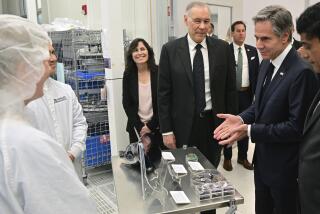Sony Will Make Chips in Texas, Share Technology
- Share via
Sony Corp., whose buying spree here has included purchases of CBS Records and Columbia Pictures, is making its biggest move yet into U.S. computer markets by purchasing its first American semiconductor plant, it was disclosed Tuesday.
In an unusual move, the giant Japanese company also agreed to share its chip-making know-how with Advanced Micro Devices, making the deal one of the first transfers of technology to the United States from Japan and an acknowledgement that Japanese chip-making skills are superior to American. Most arrangements have gone the other direction, with Japanese firms acquiring licenses to U.S. technology.
Sony will begin U.S. production of semiconductors under an agreement to acquire a San Antonio chip-making plant from Advanced Micro Devices, the nation’s fifth-largest chip maker. In return, the Sunnyvale, Calif.-based company will get $55 million.
Some analysts interpreted the move as a signal that Sony’s globalization strategy for the 1990s will include its first major move into the U.S. computer business, where it now has only a minuscule presence. Sony, which claims to be Japan’s first commercial semiconductor manufacturer, is the No. 2 supplier of computer workstations in Japan. Workstations, one of the fastest-growing segments of the computer market, are powerful desktop machines used primarily by scientists and engineers for design and simulations.
The deal is the latest of a growing number of collaborative high-tech efforts between U.S. and Japanese companies. But W. J. (Jerry) Sanders III, chairman and chief executive of Advanced Micro Devices, said the deal marked the first time that a Japanese company bought an asset of an American high-tech company without acquiring the U.S. firm as well.
“What’s unique about this,” Sanders explained, “is it is a one-way transfer of Japanese technology into America. We’re using the San Antonio plant as a means for transferring technology. If you want to learn to cook, you can buy a cookbook. But a better way to learn to cook is to work with the master chef in a kitchen.
“The Japanese are a leader in process technology and process design,” he said. “Most of us admit the Japanese have done a better job at mass production . . . (and) we can learn from them.”
Under terms of the agreement, Sony will establish its own semiconductor production line in a currently idle portion of the Texas plant. Advanced Micro Devices engineers will be assigned to the operation during a collaborative period lasting through 1994. Sony makes chips primarily for use in its own machines. In an effort to boost its chip-making abilities, it recently acquired a firm in New York state that makes semiconductor manufacturing equipment.
Sony and AMD, which have had a close working relationship for more than five years, also signed a letter of intent to collaborate on development of a new chip. Sony has been one of AMD’s biggest Japanese customers, but Sanders said AMD is “not competitive with Sony’s product line.”
Sheridan Tatsuno, a principal of NeoConcepts, a high-tech marketing firm in Fremont, said he believes that Sony is interested in extending its computer presence in Japan into the United States. “Sony is becoming a major PC and workstation player,” he said. “It will be one of the bigger players in the 1990s.”
Tatsuno also said cooperative agreements such as the Sony-AMD deal might help to mitigate some disagreements between the United States and Japan over American access to the Japan’s semiconductor market.
“Clearly, an alternative to Japan bashing is swapping know-how and technology,” Tatsuno said. “That’s what’s happening now. Many Japanese companies realize if they tighten relationships with U.S. companies it helps to lessen criticism of Japan. You don’t bash your partner. It’s impolite to bash another country when your partner comes from that country.”
Sanders said, however, that the industry is still holding to its demands on market access.
Andrew A. Procassini, president of the Semiconductor Industry Assn., agreed. “We still, as an industry, have been pursuing access as part of the U.S.-Japan trade agreement. In that, our efforts are just as strong as ever.
“We are not lessening because of these actions,” he said. “These are company-to-company relations.”






